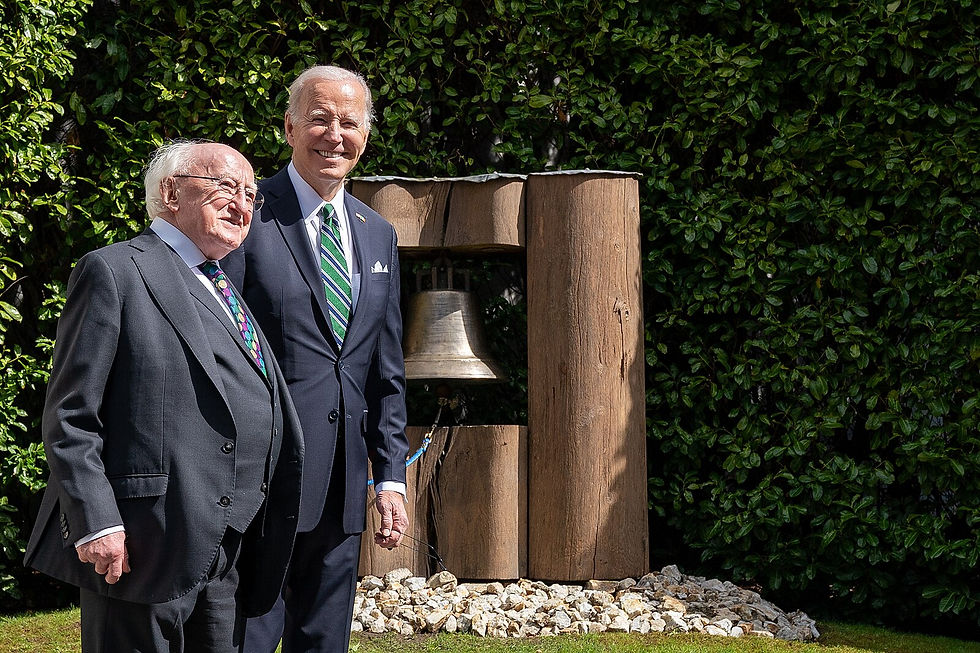Irish Neutrality May Not Survive Another European Conflict
- Sep 14, 2023
- 4 min read
Lachlan Forster | Europe & Eurasia Fellow
On May 8 2023, the Irish Times revealed it had uncovered a secret defence agreement made between the Irish and British governments during the 1950s. For the last 70 years, Ireland has relied on the Royal Air Force to patrol and protect their skies from aerial threats in what has been described as a memorandum of understanding.
It is no surprise that Westminster would consent to such an agreement. Northern Ireland’s membership in the United Kingdom means the state has a vested interest in securing Irish skies. But questions have been raised within the Republic of Ireland as to whether this agreement, in allowing a foreign nation’s armed forces into the country’s sovereign airspace, violated their official stance of neutrality.
The treaty was activated as recently as 2020, when a Russian Tupolev TU-95 aircraft entered Irish airspace, causing the RAF to scramble jets in confrontation. The Russian navy followed suit, with two ships entering the Irish Exclusive Economic Zone in March of 2023. Ireland's absence from any formal defence treaties means it relies on goodwill to protect itself, meaning its limited defence capabilities are “simply not good enough for a sovereign state”, according to TD Cathal Berry.
Neutrality is the crux of Ireland’s foreign policy. However, with European nations like Finland and Sweden abandoning their traditional non-aligned stances to pursue NATO membership, some commentators have questioned whether ongoing neutrality is still viable in the current geopolitical landscape.
A recent survey indicated that 52% of Irish citizens think the nation should join NATO. This prompted the government to announce a public forum on neutrality in which citizens were invited to give their opinions on the future direction of Ireland’s defence and military alignment policies. This potentially significant change to Ireland’s status signifies a lesson learned from Ukraine, which was a neutral nation until the Russian invasion of Crimea in 2014: neutrality is no substitute for a thorough defence policy.
Just having this conversation has attracted controversy. Neutrality is deeply engrained within the Irish character and questioning the policy of rneutrality has historically attracted criticism. Sinn Fein, the Republic of Ireland’s oldest political party, submitted that not only should neutrality be maintained, but that it should be constitutionally enshrined through a referendum, and that defence expansion must be to safeguard the nation’s non-alignment. Ireland’s President Michael Higgins also chimed in on the public forum, which he warned was “playing with fire”.
Many argue that neutrality is key to Irish sovereignty, freeing the nation from the interests of other countries that might wish to exploit its politics for regional gain. The more cynical maintain that the policy is a scheme to get other countries, like neighbours UK and France, to pay for their defence.
On the positive side, neutrality kept Ireland out of the controversial War on Terror in Iraq and Afghanistan. However, Ireland also stayed neutral throughout World War II, which is domestically referred to as The Emergency. Although the country maintains it did help the allied war effort, the condolence message sent by then Irish President Eamon de Valera to Germany following Adolf Hitler’s suicide is a clear indication of how blind neutrality can quickly slide into wishful and opportunistic ignorance.
All of these arguments have been raised time and again to support the two sides of the debate, but the reality of the situation is that Ireland is not free from danger and that the sole policy of neutrality is no longer a defence against aggression in the twenty-first century.
Something will very likely have to change, or else Ireland will continue to be the victim of simulated missile strikes and territorial incursions from the Russian armed forces. The nation shrugged it’s shoulders while Russia entertained holding military exercises and missiles strikes within its Exclusive Economic Zone, potentially endangering domestic citizens and particularly fishermen. This is all while paradoxically asking the British, who many in government maintain are the colonial enemy for keeping a hold of Ulster, to do the heavy lifting of defence for them.
If it were to give up on neutrality, Ireland would be abandoning a significant responsibility that it has taken upon itself. Irish soldiers have been a constant presence within United Nations peacekeeping activities, continuing to serve in Lebanon, Cyprus, and the Central African Republic. Further, foreign aid was allocated €1.233 billion in the Irish budget, going towards development efforts within Syria, Ethiopia, and Timor-Leste among other nations.
Should Ireland abandon neutrality, it is highly likely that these efforts will be severely limited or potentially scrapped in favour of heightened armament efforts. Though other nations may be able to fill this gap, the uniqueness of Irish neutrality meant these programs could be trusted to come from a genuine motivation to help people in need. Unfortunately, there is no country in the world that could take up these causes with the same enterprise.
However, in the present atmosphere of Europe, it is no longer appropriate for Ireland to rely on the interests of the United Kingdom and the assumption that allies would defend it should anything happen, without formal agreements to back up these beliefs.
But whilst Ireland considers its future, the world must also consider what it is losing with so many neutral nations rearming, and how future crises will be approached with a lack of resources and support from the once reliable non-aligned nations of Europe.
Lachlan Forster is the Europe & Eurasia Fellow for Young Australians in International Affairs.
A student of international Relations and History at the University of Melbourne, Lachlan is currently in Malaysia on a 2023 New Colombo Plan Scholarship. He is a contributing writer with the Young Diplomats Society and Asia in Review, and has also been published in the Herald Sun, the Chariot Undergraduate Journal of History, and Farrago.




Comments